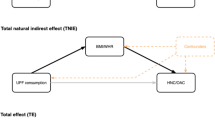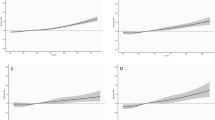Abstract
Purpose of Review
To review recent data on the role and interactions of fiber and fat as dietary risk factors associated with colorectal cancer (CRC) risk in humans.
Recent Findings
Fiber intake shows convincing and linear dose-response negative correlation with CRC risk. Dietary fiber stimulates butyrogenic activity of the gut microbiota, providing high amounts of butyrate that shows extensive anti-neoplastic effects. A high-fat diet promotes CRC risk through stimulated bile acid metabolism, facilitating bile acid conversion by the gut microbiota to tumor-promoting deoxycholic acid. Comprehensive interactions of these microbial metabolites are likely to underlie mechanisms driving diet-dependent CRC risk in different populations, but require further experimental investigation.
Summary
Dietary fiber and fat shape the composition and metabolic function of the gut microbiota, resulting in altered amounts of butyrate and deoxycholic acid in the colon. Fiber supplementation and restriction of fat intake represent promising strategies to reduce CRC risk in healthy individuals.

Similar content being viewed by others
References
Papers of particular interest, published recently, have been highlighted as: • Of importance •• Of major importance
Ferlay J, Soerjomataram I, Dikshit R, Eser S, Mathers C, Rebelo M, et al. Cancer incidence and mortality worldwide: sources, methods and major patterns in GLOBOCAN 2012. Int J Cancer. 2015;136:E359–86.
Arnold M, Sierra MS, Laversanne M, Soerjomataram I, Jemal A, Bray F. Global patterns and trends in colorectal cancer incidence and mortality. Gut. 2017;66:683–91.
Jasperson KW, Tuohy TM, Neklason DW, Burt RW. Hereditary and familial colon cancer. Gastroenterology. 2010;138:2044–58.
O’Keefe SJD. Diet, microorganisms and their metabolites, and colon cancer. Nat Rev Gastroenterol Hepatol. 2016;13:691–706.
•• Reynolds A, Mann J, Cummings J, Winter N, Mete E, Morenga LT. Carbohydrate quality and human health: a series of systematic reviews and meta-analyses. The Lancet. 2019. https://doi.org/10.1016/S0140-6736(18)31809-9. Comprehensive meta-analysis of observational studies and clinical trials, showing an inverse correlation of dietary fiber intake or whole grain intake, respectively, and CRC risk. CRC risk reduction is greatest for highest intake of dietary fiber or whole grain, respectively, and linear dose-response relationships suggest even greater effects on CRC risk reduction for higher intakes.
Kunzmann AT, Coleman HG, Huang W-Y, Kitahara CM, Cantwell MM, Berndt SI. Dietary fiber intake and risk of colorectal cancer and incident and recurrent adenoma in the Prostate, Lung, Colorectal, and Ovarian Cancer Screening Trial. Am J Clin Nutr. 2015;102:881–90.
Llewellyn SR, Britton GJ, Contijoch EJ, Vennaro OH, Mortha A, Colombel J-F, et al. Interactions between diet and the intestinal microbiota alter intestinal permeability and colitis severity in mice. Gastroenterology. 2018;154:1037–1046.e2.
•• O’Keefe SJD, Li JV, Lahti L, et al. Fat, fibre and cancer risk in African Americans and rural Africans. Nat Commun. 2015;6:6342. Dietary intervention trial comparing the impact of different diets in African American (high-fat, low-fiber) and rural African (low-fat, high-fiber) people on microbial, metabolic, and mucosal markers associated with CRC risk. A diet switch between both groups demonstrates that changes in microbiota composition and microbial metabolites associated with CRC risk are largely mediated by diet. Critically, this correlates with mucosal markers of proliferation and inflammation in the colon.
Wu GD, Compher C, Chen EZ, et al. Comparative metabolomics in vegans and omnivores reveal constraints on diet-dependent gut microbiota metabolite production. Gut. 2016;65:63–72.
• Sonnenburg ED, Smits SA, Tikhonov M, Higginbottom SK, Wingreen NS, Sonnenburg JL. Diet-induced extinctions in the gut microbiota compound over generations. Nature. 2016;529:212–5. Experimental study demonstrating that alterations in murine gut microbiota caused by a diet low in microbiota-accessible carbohydrates (MAC) are reversible within a single generation by reintroduction of MAC, but not after exposing several generations to the low-MAC diet.
Flint HJ, Duncan SH, Louis P. The impact of nutrition on intestinal bacterial communities. Curr Opin Microbiol. 2017;38:59–65.
Desai MS, Seekatz AM, Koropatkin NM, et al. A dietary fiber-deprived gut microbiota degrades the colonic mucus barrier and enhances pathogen susceptibility. Cell. 2016;167:1339–1353.e21.
• Schroeder BO, Birchenough GMH, Ståhlman M, Arike L, Johansson MEV, Hansson GC, et al. Bifidobacteria or fiber protects against diet-induced microbiota-mediated colonic mucus deterioration. Cell Host Microbe. 2018;23:27–40.e7. Experimental study demonstrating that changes in gut microbiota composition caused by Western diet promote an impaired mucus barrier function in mice, which is prevented by introduction of Bifidobacterium longum or administration of inulin as source of fiber.
Mehta RS, Nishihara R, Cao Y, et al. Association of dietary patterns with risk of colorectal cancer subtypes classified by Fusobacterium nucleatum in tumor tissue. JAMA Oncol. 2017. https://doi.org/10.1001/jamaoncol.2016.6374.
Castellarin M, Warren RL, Freeman JD, et al. Fusobacterium nucleatum infection is prevalent in human colorectal carcinoma. Genome Res. 2012;22:299–306.
Kostic AD, Gevers D, Pedamallu CS, et al. Genomic analysis identifies association of Fusobacterium with colorectal carcinoma. Genome Res. 2012;22:292–8.
•• Donohoe DR, Holley D, Collins LB, et al. A gnotobiotic mouse model demonstrates that dietary fiber protects against colorectal tumorigenesis in a microbiota- and butyrate-dependent manner. Cancer Discov. 2014;4:1387–97. This experimental study uses a gnotobiotic CRC mouse model to demonstrate that the tumorsuppressive effect of dietary fiber is microbiota- and butyrate-dependent. It also shows that butyrate accumulates in tumor colonic epithelial cells acting as histone deacetylase inhibitor, potentially inhibiting colorectal tumorigenesis.
Le Leu RK, Winter JM, Christophersen CT, et al. Butyrylated starch intake can prevent red meat-induced O6-methyl-2-deoxyguanosine adducts in human rectal tissue: a randomised clinical trial. Br J Nutr. 2015;114:220–30.
Schulz MD, Atay C, Heringer J, et al. High-fat-diet-mediated dysbiosis promotes intestinal carcinogenesis independently of obesity. Nature. 2014;514:508–12.
Islam KBMS, Fukiya S, Hagio M, Fujii N, Ishizuka S, Ooka T, et al. Bile acid is a host factor that regulates the composition of the cecal microbiota in rats. Gastroenterology. 2011;141:1773–81.
Cao H, Xu M, Dong W, et al. Secondary bile acid-induced dysbiosis promotes intestinal carcinogenesis. Int J Cancer. 2017. https://doi.org/10.1002/ijc.30643.
Ocvirk S, O’Keefe SJ. Influence of bile acids on colorectal cancer risk: potential mechanisms mediated by diet - gut microbiota interactions. Curr Nutr Rep. 2017;6:315–22.
Dermadi D, Valo S, Ollila S, Soliymani R, Sipari N, Pussila M, et al. Western diet deregulates bile acid homeostasis, cell proliferation, and tumorigenesis in colon. Cancer Res. 2017;77:3352–63.
• Sheng L, Jena PK, Hu Y, Liu H-X, Nagar N, Kalanetra KM, et al. Hepatic inflammation caused by dysregulated bile acid synthesis is reversible by butyrate supplementation. J Pathol. 2017;243:431–41. Comprehensive experimental study that compares mice lacking the farnesoid X receptor to wild-type mice using Western or control diet. It demonstrates complex interactions of hepatic bile acid metabolism and butyrogenesis in the colon, suggesting an inverse association of hepatic deoxycholic acid and colonic butyrate.
Wirbel J, Pyl PT, Kartal E, et al. Meta-analysis of fecal metagenomes reveals global microbial signatures that are specific for colorectal cancer. Nat Med. 2019;25:679.
Caesar R, Tremaroli V, Kovatcheva-Datchary P, Cani PD, Bäckhed F. Crosstalk between gut microbiota and dietary lipids aggravates WAT inflammation through TLR signaling. Cell Metab. 2015;22:658–68.
Devkota S, Wang Y, Musch MW, Leone V, Fehlner-Peach H, Nadimpalli A, et al. Dietary-fat-induced taurocholic acid promotes pathobiont expansion and colitis in Il10-/- mice. Nature. 2012;487:104–8.
Lam YY, Ha CWY, Hoffmann JMA, et al. Effects of dietary fat profile on gut permeability and microbiota and their relationships with metabolic changes in mice. Obesity. 2015;23:1429–39.
Yazici C, Wolf PG, Kim H, et al. Race-dependent association of sulfidogenic bacteria with colorectal cancer. Gut. 2017;66:1983–94.
Van Hecke T, Vossen E, Vanden Bussche J, Raes K, Vanhaecke L, De Smet S. Fat content and nitrite-curing influence the formation of oxidation products and NOC-specific DNA adducts during in vitro digestion of meat. PLoS One. 2014;9:e101122.
Beyaz S, Mana MD, Roper J, et al. High-fat diet enhances stemness and tumorigenicity of intestinal progenitors. Nature. 2016;531:53–8.
Jakobsdottir G, Xu J, Molin G, Ahrné S, Nyman M. High-fat diet reduces the formation of butyrate, but increases succinate, inflammation, liver fat and cholesterol in rats, while dietary fibre counteracts these effects. PLoS ONE. 2013;8:e80476.
Wan Y, Wang F, Yuan J, et al. Effects of dietary fat on gut microbiota and faecal metabolites, and their relationship with cardiometabolic risk factors: a 6-month randomised controlled-feeding trial. Gut. 2019. https://doi.org/10.1136/gutjnl-2018-317609.
Reddy BS, Sharma C, Simi B, Engle A, Laakso K, Puska P, et al. Metabolic epidemiology of colon cancer: effect of dietary fiber on fecal mutagens and bile acids in healthy subjects. Cancer Res. 1987;47:644–8.
Reddy B, Engle A, Katsifis S, Simi B, Bartram HP, Perrino P, et al. Biochemical epidemiology of colon cancer: effect of types of dietary fiber on fecal mutagens, acid, and neutral sterols in healthy subjects. Cancer Res. 1989;49:4629–35.
Bartram HP, Englert S, Scheppach W, Dusel G, Richter F, Richter A, et al. Antagonistic effects of deoxycholic acid and butyrate on epithelial cell proliferation in the proximal and distal human colon. Z Gastroenterol. 1994;32:389–92.
McMillan L, Butcher S, Wallis Y, Neoptolemos JP, Lord JM. Bile acids reduce the apoptosis-inducing effects of sodium butyrate on human colon adenoma (AA/C1) cells: implications for colon carcinogenesis. Biochem Biophys Res Commun. 2000;273:45–9.
Rosignoli P, Fabiani R, De Bartolomeo A, Fuccelli R, Pelli MA, Morozzi G. Genotoxic effect of bile acids on human normal and tumour colon cells and protection by dietary antioxidants and butyrate. Eur J Nutr. 2008;47:301–9.
Zeng H, Claycombe KJ, Reindl KM. Butyrate and deoxycholic acid play common and distinct roles in HCT116 human colon cell proliferation. J Nutr Biochem. 2015;26:1022–8.
Perdue DG, Haverkamp D, Perkins C, Daley CM, Provost E. Geographic variation in colorectal cancer incidence and mortality, age of onset, and stage at diagnosis among American Indian and Alaska Native people, 1990-2009. Am J Public Health. 2014;104(Suppl 3):S404–14.
Gill CIR, Heavey P, McConville E, Bradbury I, Fässler C, Mueller S, et al. Effect of fecal water on an in vitro model of colonic mucosal barrier function. Nutr Cancer. 2007;57:59–65.
Windey K, De Preter V, Huys G, Broekaert WF, Delcour JA, Louat T, et al. Wheat bran extract alters colonic fermentation and microbial composition, but does not affect faecal water toxicity: a randomised controlled trial in healthy subjects. Br J Nutr. 2015;113:225–38.
Ou J, Carbonero F, Zoetendal EG, DeLany JP, Wang M, Newton K, et al. Diet, microbiota, and microbial metabolites in colon cancer risk in rural Africans and African Americans. Am J Clin Nutr. 2013;98:111–20.
Acknowledgments
We wish to thank the administration and outpatient clinic and pharmacy staffs at the Alaska Native Medical Center in Anchorage, Alaska, and Manguzi Hospital in Manguzi, KwaZulu-Natal, South Africa, for their support of the project. We also thank all participants for their willingness to participate in the study.
Funding
Soeren Ocvirk is supported by the German Research Foundation (Deutsche Forschungsgemeinschaft, 338582098). Stephen JD O’Keefe is supported by the National Institutes of Health (R01 CA204403).
Author information
Authors and Affiliations
Corresponding author
Ethics declarations
Conflict of Interest
The authors declare that they have no conflict of interest.
Human and Animal Rights and Informed Consent
Fecal samples, used for preparation of water extracts, were taken during previous studies, where ethical and health research approval was obtained from all institutional review boards of all participating medical centers and health research entities. Informed consent was acquired before enrollment of study participants.
Additional information
Publisher’s Note
Springer Nature remains neutral with regard to jurisdictional claims in published maps and institutional affiliations.
This article is part of the Topical Collection on GI Oncology
Rights and permissions
About this article
Cite this article
Ocvirk, S., Wilson, A.S., Appolonia, C.N. et al. Fiber, Fat, and Colorectal Cancer: New Insight into Modifiable Dietary Risk Factors. Curr Gastroenterol Rep 21, 62 (2019). https://doi.org/10.1007/s11894-019-0725-2
Published:
DOI: https://doi.org/10.1007/s11894-019-0725-2




